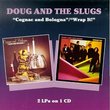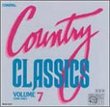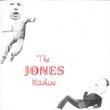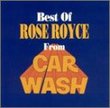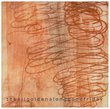| All Artists: Johnny Doherty Title: Bundle & Go Members Wishing: 0 Total Copies: 0 Label: Green Linnet Release Date: 10/5/1993 Genres: Folk, International Music, Pop Styles: Traditional Folk, Celtic Number of Discs: 1 SwapaCD Credits: 1 UPCs: 048248307741, 048248307727 |
Search - Johnny Doherty :: Bundle & Go
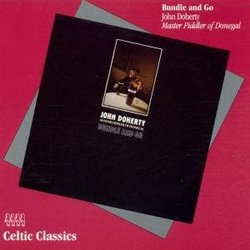 | Johnny Doherty Bundle & Go Genres: Folk, International Music, Pop
|
Larger Image |
CD DetailsSimilar CDs |
CD ReviewsEssential Christopher | Florida, USA | 06/27/2006 (5 out of 5 stars) "John Doherty plays the tunes straight through, going a mile a minute. The playing is strong, impressive, and unmistakable. This is essential listening, and it's a shame that it's out of print. 'The Celebrated Recordings' are now widely available, and should be purchased (at least temporarily) in place of 'Bundle and Go'. Also similar are recordings by fellow Donegal fiddlers like Con Cassidy, Hugh Gillespie, James and Francie Byrne, Vincent Campbell. Many are collected on the CD "The Brass Fiddle"." Legendary Irish fiddling Sanpete | in Utah | 08/08/2008 (5 out of 5 stars) "John Doherty is regarded by many as his generation's preeminent representative of a musical and cultural tradition that in some ways died with him. County Donegal in Ireland is well known in the world of fiddling for its distinctive style. Doherty was born into a family with deep musical roots in Donegal, early enough, around 1895, that there were still itinerant fiddler/tinsmiths who traveled from town to town making and repairing metal implements, telling stories, and playing the fiddle. He took up this profession, seldom carrying his own fiddle because there was bound to be one available at whatever home he stayed at in the county. Now, in the age of shopping malls, TV and iPods, that kind of life is long gone. Some of the musical tradition is carried on by younger musicians of a very different background, and we have a few recordings of Doherty himself.
Doherty was both a representative of Donegal fiddling style and a unique player with his own distinctive style. The dominant overall stylistic point is the influence of the Highland bagpipes, and apparently (the CD notes tell us) the similar piob mor, sometimes called Irish war pipes, large bagpipes played throughout Ireland and which were the other main traditional instrument with the fiddle in Donegal for the last two centuries. The resemblance to the sound of the bagpipes is sometimes astonishing. This is accomplished by playing one note per bow stroke with an aggressive attack, an edgy tone also imparted by the strong bowing, frequent staccato ornamentation that resembles the sputtering ornamentation of the pipes (especially triplets), and in some pieces a very effective use of slides, i.e. starting with a note slightly below the target note and quickly sliding up to it. The short bow strokes prevent the imitation of the drone of the pipes in what might be the most effective way, by means of long bowstrokes in which a second string is played in addition to the melody (only the last cut on the CD is slow enough to include that technique in a way that might resemble a pipe drone), but Doherty does use a fair amount of double notes (double stops and drones). The influence of the pipes may also explain why Doherty's playing is generally fairly straight-ahead and "unswung," though there is some lilt to it. Except for the last selection, his pace is lively, but these recordings are somewhat more relaxed, maybe bringing out more of a sad edge, than some he did in earlier years. One reason the bagpipe styling stands out in this recording is that the music included was selected to emphasize that influence. There are many older tunes, and tunes originally borrowed from the bagpipe repertoire. These recordings are out of their natural context, which would include storytelling and conversation. Strung together as they are here conveys a more cramped, rushed feeling than the pieces would have had in life. These were recorded in 1977, when Doherty was about 83, so he was undoubtedly not at his peak. Even so, his technique is amazingly strong, with lightning bowing and fingering and lots of vigor. The main technical issue appears to be some occasional slight intonation faults, though it's not always clear how much of this was a stylistic choice. As was his custom, he played on a borrowed fiddle. These were his last recordings; he died in 1980. The sound is good mono, everything clear." |

 Track Listings (27) - Disc #1
Track Listings (27) - Disc #1